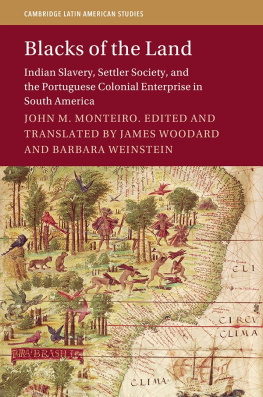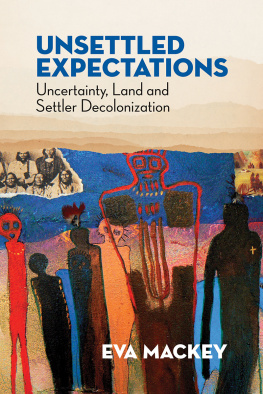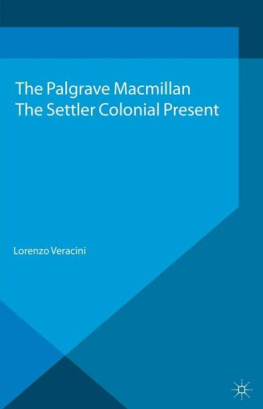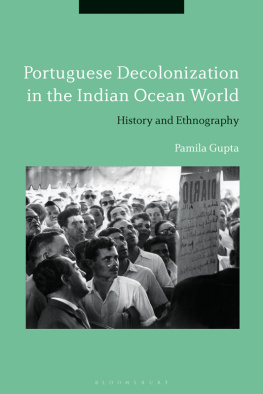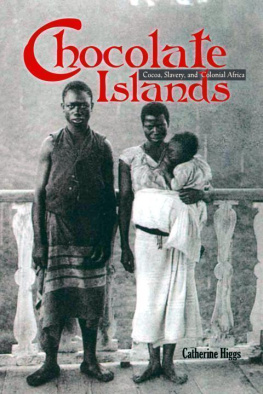Blacks of the Land
Originally published in Portuguese in 1994 as Negros da Terra , this field-defining work by the late historian John M. Monteiro has been translated into English by Professors James Woodard and Barbara Weinstein. Monteiros work established ethnohistory as a field in colonial Brazilian studies and made indigenous history a vital part of how scholars understand Brazils colonial past. Drawing on over two dozen collections on both sides of the Atlantic, Monteiro rescued Indians from invisibility, documenting their roles as both objects and actors in Brazils colonial past and, most importantly, providing the first history of Indian slavery in Brazil. Monteiro demonstrates how Indian enslavement, not exploration or the search for mineral wealth, was the driving force behind expansion out of So Paulo and through the South American backcountry. This book makes a groundbreaking contribution not only to Latin American history, but to the history of indigenous slavery in the Americas generally.
John M. Monteiro was a professor in the department of anthropology of the Universidade Estadual de Campinas and the director of the same universitys Instituto de Filosofia e Cincias Humanas. He also held visiting positions at the University of North Carolina at Chapel Hill, the University of Michigan, and Harvard University.
James Woodard is Professor of History at Montclair State University. He is the author of A Place in Politics: So Paulo, Brazil, from Seigneurial Republicanism to Regionalist Revolt (2009).
Barbara Weinstein is Silver Professor of History at New York University and Past President of the American Historical Association. She is the author of The Color of Modernity: So Paulo and the Making of Race and Nation in Brazil (2015), For Social Peace in Brazil: Industrialists and the Remaking of the Working Class in So Paulo, 19201964 (1996), and The Amazon Rubber Boom, 18501920 (1983).
Cambridge Latin American Studies
General Editors
KRIS LANE, Tulane University
MATTHEW RESTALL, Pennsylvania State University
Editor Emeritus
HERBERT S. KLEIN
Gouverneur Morris Emeritus Professor of History, Columbia University and Hoover Research Fellow, Stanford University
Other Books in the Series
The Street is Ours: Community, the Car, and the Nature of Public Space in Rio de Janeiro , Shawn William Miller
Laywomen and the Making of Colonial Catholicism in New Spain, 16301790 , Jessica L. Delgado
Urban Slavery in Colonial Mexico: Puebla de los ngeles, 15311706 , Pablo Miguel Sierra Silva
The Mexican Revolutions Wake: The Making of a Political System, 19201929 , Sarah Osten
Latin Americas Radical Left: Rebellion and Cold War in the Global 1960s , Aldo Marchesi
Liberalism as Utopia: The Rise and Fall of Legal Rule in Post-Colonial Mexico, 18201900 , Timo H. Schaefer
Before Mestizaje: The Frontiers of Race and Caste in Colonial Mexico , Ben Vinson III
The Lords of Tetzcoco: The Transformation of Indigenous Rule in Postconquest Central Mexico , Bradley Benton
Theater of a Thousand Wonders: A History of Miraculous Images and Shrines in New Spain , William B. Taylor
Indian and Slave Royalists in the Age of Revolution , Marcela Echeverri
Indigenous Elites and Creole Identity in Colonial Mexico, 15001800 , Peter Villella
Asian Slaves in Colonial Mexico: From Chinos to Indians , Tatiana Seijas
Black Saint of the Americas: The Life and Afterlife of Martn de Porres , Celia Cussen
The Economic History of Latin America since Independence , Third Edition, Victor Bulmer-Thomas
The British Textile Trade in South America in the Nineteenth Century , Manuel Llorca-Jaa
( Continued )
Blacks of the Land
Indian Slavery, Settler Society, and the Portuguese Colonial Enterprise in South America
John M. Monteiro
Edited and Translated by
James Woodard
Montclair State University
Barbara Weinstein
New York University
University Printing House, Cambridge cb2 8bs, United Kingdom
One Liberty Plaza, 20th Floor, New York, ny 10006, USA
477 Williamstown Road, Port Melbourne, vic 3207, Australia
314321, 3rd Floor, Plot 3, Splendor Forum, Jasola District Centre, New Delhi 110025, India
79 Anson Road, #0604/06, Singapore 079906
Cambridge University Press is part of the University of Cambridge.
It furthers the Universitys mission by disseminating knowledge in the pursuit of education, learning, and research at the highest international levels of excellence.
www.cambridge.org
Information on this title: www.cambridge.org/9781107114678
doi: 10.1017/9781316335406
Cambridge University Press 2018
The text translated here was first published in Portuguese as Negros da terra: ndios e bandeirantes nas origens de So Paulo by John M. Monteiro (So Paulo: Companhia das Letras, 1994).
First published in English by Cambridge University Press 2018 as Blacks of the Land: Indian Slavery, Settler Society, and the Portuguese Colonial Enterprise in South America ; translation by James Woodard and Barbara Weinstein.
This publication is in copyright. Subject to statutory exception and to the provisions of relevant collective licensing agreements, no reproduction of any part may take place without the written permission of Cambridge University Press.
Printed in the United states of America by Sheridan Books, Inc.
A catalogue record for this publication is available from the British Library.
Library of Congress Cataloging-in-Publication Data
Names: Monteiro, John M. (John Manuel), 1956 author. | Weinstein, Barbara, translator, editor. | Woodard, James P., 1975 translator, editor.
Title: Blacks of the land : Indian slavery and the origins of colonial Sao Paulo / John M. Monteiro ; translated and edited by Barbara Weinstein, James Woodard.
Description: Cambridge, United Kingdom ; New York, NY : Cambridge University Press, [2018] | Series: Cambridge Latin American studies | Includes bibliographical references.
Identifiers: LCCN 2018012563 | ISBN 9781107114678 (hardback) | ISBN 9781107535183 (paperback)
Subjects: LCSH: Indians of South America Brazil So Paulo (State) History. | Indian slaves Brazil So Paulo (State) | Slavery Brazil So Paulo (State) | Bandeiras Brazil So Paulo (State) | So Paulo (Brazil : State) Economic conditions.
Classification: LCC F 2519.1. S 2 M 65 2018 | DDC 981/.61dc23
LC record available at https://lccn.loc.gov/2018012563
isbn 978-1-107-11467-8 Hardback
isbn 978-1-107-53518-3 Paperback
Cambridge University Press has no responsibility for the persistence or accuracy of URLs for external or third-party internet websites referred to in this publication and does not guarantee that any content on such websites is, or will remain, accurate or appropriate.
Foreword
James Woodard
Beginning in the 1490s in the Caribbean, and through the slow demise of native slavery in North and South America over the eighteenth and nineteenth centuries, millions of Amerindians were subjected to enslavement, captivity, and forced labor. Indian slavery was practiced across the Americas, at one point in time or another, in jurisdictions claimed by every European power that engaged in New World colonialism. Spanish, Portuguese, Dutch, English, Scottish, French, and Russian colonists held native Americans as slaves, exerting their mastery over them and dealing in them as chattel. In parts of the United States, Mexico, and Brazil, native slavery survived the ending of European colonial claims and the formation of independent nation-states, lasting well into the nineteenth century. By that point, however, the numbers of Amerindians held as slaves in Brazil and the United States were tiny compared to the masses of African and Afro-American captives that made up the absolute majority of the populations of the two countries plantation zones. Indian slavery thus seemed a small thing economically, socially, demographically when set alongside African and Afro-American slavery, on the ascent through the first half of the new century in Brazil and the southern United States alike.

